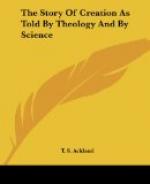But there remains yet one method to be attempted. If there is reason to believe that the Bible is the Word of God, just as the universe is His Work, then we may well expect that each of them will throw light upon and help us to a right understanding of the other. And if there be one part beyond all others in which this may be confidently looked for, it is that part in which the Divine Architect describes His own work. We know how difficult it is to understand a complicated process, or a complex piece of machinery, from a mere written description; and how our difficulty is lessened if we have the opportunity of inspecting the machinery or the process. Just in the same way we may expect to encounter difficulties, and to form erroneous conclusions when we study by itself such a document as the history of Creation, and we may well expect that those difficulties will be diminished, and those errors corrected by an examination of that material universe, the production of which it describes. And, on the other hand, if science—the study of the universe—is found to throw light upon and to receive light from the Bible, this is a fresh proof that the Bible and the universe are from the same source; the authority of the Bible is more firmly established, and the conclusions arrived at by men of science are confirmed.
But before this can be done to any good purpose, something is required from both the contending parties. The theological party must be prepared to sacrifice many an old opinion, many a cherished belief. Great care must be taken to discriminate between the genuine statements of the Mosaic Record, and the old interpretations which have been incorporated into and identified with those statements. Some, perhaps, may fear lest, in rejecting those interpretations, they may be setting at nought an authority to which they ought to submit, since these interpretations seem to have the sanction of the Church. But it can hardly be maintained that those promises of Divine guidance and protection from error which were given to the Church extended to such matters as this. No question of faith or duty is involved in the interpretation which we may give to the details of Creation. If there are some parts of the Bible in which the earliest interpretation is unquestionably the true one, there are also other parts, such as many of the prophecies, which became intelligible only when light was thrown upon them by subsequent events. And so it seems to be with the Record of Creation: it can only be rightly understood in proportion as we become acquainted with the details of the matters to which it refers. Any interpretation which was put upon it before those details were brought to light must of necessity be liable to error.




